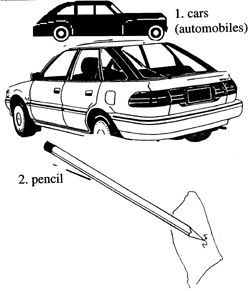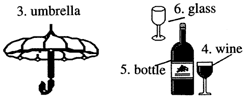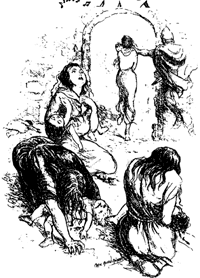Unit 35: Money
Pictured Words

| cars (automobiles)
|
| pencil
|

| umbrella
|
| wine
|
| bottle
|
| glass
|
New Words
Nouns
Adjective
Sayings
Is this the bus stop?
What is the price of a rail ticket?
Please give me some small change to put in my pocket.
Are the police at the station?
What time does the train leave?
You may get the time from the clock.
There are taxis at the station, which is near the town square.
I have come to hire a car, fill it up, please.
Where will I get some wine?
Money
You have seen the words talent and shekel in some of the stories:
The Queen of Sheba gave King Solomon "a hundred and twenty talents of gold".
Naaman took with him "ten talents of silver and six thousand shekels of gold".
These are examples of special measures for money in Israel.
The two metals gold and silver have always been of great value in trade between nations.
In other countries, there are many other substances which were made use of as money, even down to brightly colored bits of glass.
You will need to know the English systems of money measurement.
They were once based on a weight of gold and silver.
The term pound was once such a measure.
The pound is still the main measure in Britain.
But in America the main unit of money is the dollar.
Pounds are divided into shillings and pence in Britain.
Dollars are divided into quarters and cents in America.
There are special names for the sub-divisions of these units in different countries that now use the English language. So, it is not possible to give a full list here.
All you need to know is that the British say pounds, shillings and pence and the Americans say dollars, quarters and cents.
You will quickly make adjustments in the country of your choice.

Herod Takes Action
An angel of the Lord came to Joseph in a dream, saying, Get up and take the young child and his mother, and go into Egypt, and do not go from there till I give you word;
for Herod will be searching for the young child to put him to death. So he took the young child and his mother by night, and went into Egypt;
and was there till the death of Herod, so that the word of the Lord through the prophet might come true, Out of Egypt have I sent for my son.
Then Herod, when he saw that he had been tricked by the wise men, was very angry;
and he sent out, and put to death all the male children in Beth-lehem and in all the parts round about it, from two years old and under, acting on the knowledge which he had got with care from the wise men.
But when Herod was dead, an angel of the Lord came in a dream to Joseph in Egypt saying, Get up and take the young child and his mother, and go into the land of Israel: because they who were attempting to take
And he got up, and took the young child and his mother, and came into the land of Israel.
But when it came to his ears that another was ruling in the place of his father Herod, he was in fear of going there;
and God having given him news of the danger in a dream, he went out of the way into the country parts of Galilee.
And he came and was living in a town named Nazareth.
Additional Reading
There are two sides to this story.
Both of them come about because there could not be two kings -- or so Herod had in mind.
On the one hand Herod gave the order for all the male children to be killed in the place where Jesus had his birth.
It was a very sad time, as we can see from the picture of them being put to death.
The mothers were all crying at this cruel act.
On the other hand, we see that God said to Joseph to take his baby to the far distant country of Egypt.
There would be no fear of what King Herod might do when at so great a distance.
We give this the name, "The Flight to Egypt".
This was not a good time for Joseph and Mary.
There would be many hard experiences, both when walking so far and when making a new home in a strange country.
We may get some knowledge of these experiences from like troubles in the world today.
Many persons now have to make long journeys to get out of danger.
A lady gives us the story of a girl from Cambodia to whom she was teaching English, just as you are learning!
As she gave her a picture of "The Flight to Egypt" she kept looking at Mary, the baby Jesus, Joseph and the animal walking all that long way.
She had had the same experience as she made her way to America through the Philippines, where she had almost been kept back by the authorities.
She said "How hard it must have been on their feet!
Were they short of food and water?
Was it not hard to go away from their own country to get away suddenly from King Herod?"
Getting free of the authorities!
Somehow we see that as being an experience for today only.
But, Jesus and his family had to get away from authorities too, just as so many are doing now.
We do not readily see the journey to Egypt as a get away, but it is a story for each of us today in our own troubles and it has always been quite as true for all men.
Helpful Notes
| angel of the Lord
| bearer of news from God.
|
| got with care
| with careful questioning.
|
| hard experiences
| troubles and hard times.
|
| Cambodia
| a country near India.
|
| free of authorities
| away from government control.
|
| a get away
| getting one's freedom.
|
Interesting Facts and Records
Looking At Language
The main difficulty for the early followers of Jesus must have seemed their ability to really do what he said: "Give the Good News to all men, beginning at Jerusalem".
There were so many different languages.
How would one say things with good sense to persons who had a different language?
It is said that a man with the name, Francis Xavier, went to the East from Europe and said words in his own language to the persons there.
He was heard with sense by persons who had another quite different language!
Such a thing certainly happened on the day which has the name, The Day of Pentecost.
It was a great surprise to men from other countries.
This sign gave great pleasure to the followers of Jesus.
They could go and say things with sense to their hearers!
There is a church in India with the name: Church of Thomas.
We have knowledge of Thomas as, "Doubting Thomas".
That does not seem right for him.
History has it that Thomas went on Arab boats to South India and gave the Good News there.
The language there was quite different to that of Thomas.
How did he make his words have clear sense to persons there?
It is also said that Thomas went to North India by walking overland.
Again, the language is quite different in North India.
We have knowledge of other persons who took long journeys to take the Good News.
There were no automobiles, no time tables nor even clocks for journeys in those days.
There is in China a large stone with records cut into it.
These say that many persons came there with the Good News.
This stone has the name: The Nestorian Monument.
The persons who came there made their journey from the South of Europe to that far away place.
It is a very great distance to go for a journey.
The language differences are very great and increase all the way along that journey.
These folk took very wise steps to overcome these difficulties.
They took work as care takers of horses and as house girls.
Their sole purpose was to take the Good News wherever they went.
They had no porters, no taxis, no railways, they simply went on foot.
There were no police to care of them.
Their sense of responsibility to the spread of the Good News was stiff and strong.
The acid test to their will was the degree to which they kept going.
And they got as far as China!
Others have made journeys to distant countries.
Not long ago the Church in Russian countries paid respect to a man named: St. Cyril.
Cyril came to Russia from the South of Europe 1000 years ago with the Good News.
All was danger then.
But he was not one to catch a cold and sneeze in order to get away from difficulties.
He put a small group of followers there and it kept growing.
Under the umbrella of this small group or nucleus of followers the Good News went throughout Russia.
St. Cyril was a clever person.
He invented a writing system for his teachings of the Good News.
This system has been given the name of Cyrillic writing.
It is made use of throughout the Russian countries.
There have been many persons who have taken a pencil from their pocket and have made writings of the Good News in new languages.
They have often made long journeys to do this.
Their languages are now in print and are made use of on radio.